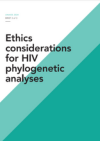Publications - Released in 2024
Ethics is a discipline or area of study concerned with issues such as benefits, harms, fairness, and rights. As an area of study and practice, ethics covers moral values and questions about what actions should be taken and which policies should be implemented. Ethical answers to these questions depend on what (beneficial or harmful) outcomes are likely to occur, but also the extent to which these outcomes will be distributed fairly through relevant populations, and the rights and interests of the people affected by actions and policies. This is the third brief in a set discussing phylogenetics and HIV in public health will discuss ethics and human rights considerations.
Throughout, we keep in mind Article 8 of the Helsinki Declaration: While the primary purpose of medical research is to generate new knowledge, this goal can never take precedence over the rights and interests of individual research subjects.
Downloads
Organizations
- Joint United Nations Programme on HIV/AIDS (UNAIDS)






